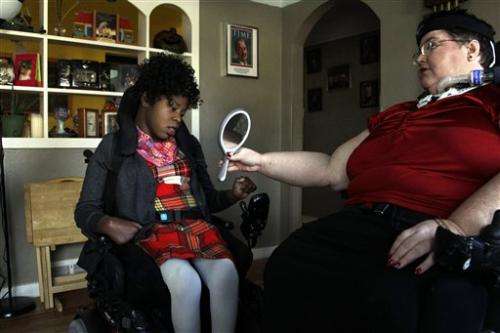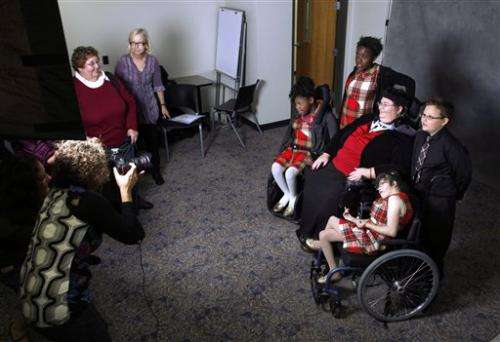Disabled parents face bias, loss of kids: report

Millions of Americans with disabilities have gained innumerable rights and opportunities since Congress passed landmark legislation on their behalf in 1990. And yet advocates say barriers and bias still abound when it comes to one basic human right: To be a parent.
A Kansas City, Missouri, couple had their daughter taken into custody by the state two days after her birth because both parents were blind. A Chicago mother, because she is quadriplegic, endured an 18-month legal battle to keep custody of her young son. A California woman paid an advance fee to an adoption agency, then was told she might be unfit to adopt because she has cerebral palsy.
Such cases are found nationwide, according to a new report by the National Council on Disability, an independent federal agency. The 445-page document is viewed by the disability-rights community as by far the most comprehensive ever on the topic—simultaneously an encyclopedic accounting of the status quo and an emotional plea for change.
"Parents with disabilities continue to be the only distinct community that has to fight to retain—and sometimes gain—custody of their own children," said autism-rights activist Ari Ne'eman, a member of the council. "The need to correct this unfair bias could not be more urgent or clear."
The U.S. legal system is not adequately protecting the rights of parents with disabilities, the report says, citing child welfare laws in most states allowing courts to determine that a parent is unfit on the basis of a disability. Terminating parental rights on such grounds "clearly violates" the intent of the 1990 Americans with Disabilities Act, the report contends.
Child-welfare experts, responding to the report, said they shared its goals of expanding supports for disabled parents and striving to keep their families together. But they said removals of children from their parents—notably in cases of significant intellectual disabilities—are sometimes necessary even if wrenching.
"At the end of the day, the child's interest in having permanence and stability has to be the priority over the interests of their parents," said Judith Schagrin, a veteran child-welfare administrator in Maryland.
The new report, titled "Rocking the Cradle: Ensuring the Rights of Parents with Disabilities and Their Children," estimates that 6.1 million U.S. children have disabled parents. It says these parents are more at risk than other parents of losing custody of their children, including removal rates as high as 80 percent for parents with psychiatric or intellectual disabilities.
Parents with all types of disabilities—physical or mental—are more likely to lose custody of their children after divorce, have more difficulty accessing assisted-reproductive treatments to bear children, and face significant barriers to adopting children, the report says.
The lead author of the new report, disability-rights lawyer Robyn Powell, says her goal was to challenge presumptions that disabled people can't be effective parents.

"Of course there are going to be some parents with disabilities who would be lousy parents—that's the same with parents without disabilities," she said. "If there is neglect, is it due to the disability? And can it be rectified by providing the necessary support?"
Ella Callow, a lawyer with the National Center for Parents with Disabilities and their Families, said the report raises fundamental questions about America's social priorities—given that state and federal laws value both the well-being of children and the rights of disabled people. The ultimate goal, she said, would be to promote both values by expanding support for disabled parents.
Schagrin, the Maryland child-welfare official, said she found parts of the report troubling because they seemed to suggest children were sometimes removed from their families only on account of parental disabilities.
"That's not why they are taken away," she said. "They are taken away because the disability has continued to the point where there's an episode of maltreatment or neglect."
Andrea Bartolo, a senior consultant at the Child Welfare League of America, said there is no question that some disabled parents encounter discrimination in the child welfare system, "sometimes inadvertently, sometimes very overtly."
Under current practices, Bartolo said, an expert assessment of a child's home life and the possible provision of services to the disabled parents might occur only after the child has been removed and "the damage has been done." Going forward, she hopes child-welfare agencies will try harder to provide support before a problem worsens, potentially reducing the need for foster-care placements.
The report urges Congress to amend the Americans with Disabilities Act to add protections for parents, and it calls on state lawmakers to eliminate disability as a distinct ground for terminating parental rights.
Disabled parents whose parenting ability comes into question often are placed at a disadvantage by parenting assessments that are inappropriate or unfair, the report says. It calls for better research to improve assessment standards and gain more knowledge about how various disabilities affect the ability to be an effective parent.
The new report stresses that improved networks of support for disabled parents—encompassing transportation, housing, health care, and outside intervention when appropriate—should be welcomed, and not viewed as evidence that the parents on their own are incapable.
When children do face removal from their disabled parents, those parents may encounter barriers to meaningful participation in their legal cases, the report says. For example, financially struggling parents may have to rely on a court-appointed attorney with no special knowledge about the effects of disability.
For disabled women who either cannot bear children or choose not to, the possible option of adoption often can be complicated. Some foreign countries, notably China, rule out disabled people as potential adoptive parents.
Elizabeth Pazdral of Davis, California, who wears a brace and uses crutches to walk because of cerebral palsy, said she encountered discrimination several years ago when she and her husband sought to adopt a child. She said one local adoption agency billed her an advance fee of $3,400, then advised that there were "serious reservations" about her ability to be a parent.
"I think it was dishonest to take my money and then tell me they were worried," said the 4-foot-tall Pazdral, 42, who is executive director of the California State Independent Living Council.
Initially distraught, Pazdral obtained legal help, paid for an occupational therapist to come to her house to assess her capabilities, and researched how other parents with disabilities had succeeded in raising children. The efforts paid off: The adoption agency dropped its objections, and in May 2008, Pazdral and her husband, a Stanford University physicist, adopted a baby girl named Madeleine.
"It was a huge life change—but that's true for any new parent," Pazdral said, recounting sleep-deprived nights, higher levels of chronic pain, and the challenge of maintaining one's energy level.
"But I start with the joy I get from being her mother—the rightness I feel," Pazdral said. "It's the best thing I have ever done with my life."
More information: National Council on Disability report: www.ncd.gov/newsroom/09272012
Copyright 2012 The Associated Press. All rights reserved. This material may not be published, broadcast, rewritten or redistributed.













